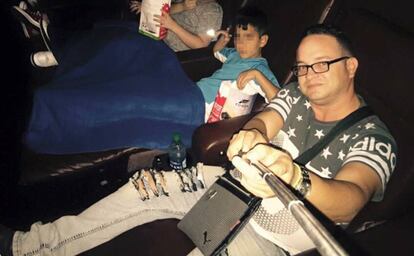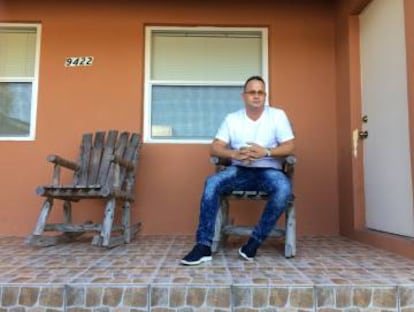Cuba’s last “dry foot” enters the US
Yunieski Marcos is the last Cuban allowed into the country under the end of wet foot-dry foot policy

At 8.30am on Friday January 20, Yunieski Marcos sat on a rocking chair on the porch of his cousin’s house in Westchester, a Miami suburb, smoking a cigarette. Cousin Roberto had gone out to take his son to school. Yunieski was wearing a brand new Calvin Klein shirt, a pair of tight-fitting jeans and a bracelet with green-and-yellow beads made specifically for him by a santero in his home town of Camagüey, in Cuba. “I am the son of Eleguá, the god who opens up the roads,” he was told by the Santería priest.

A week before this, the 33-year-old had been blessed by a statistical miracle: out of the tens of thousands of Cubans who, like himself, have crossed the US border station in Laredo, Texas over the years, Yunieski and his seven-year-old son Kevin were the very last to be allowed into the United States without visas.
The move is the result of a decision made by the Obama administration to end the longstanding “wet foot-dry foot” policy allowing Cubans who made it onto US soil, either by sea (wet) or land (dry), to legally remain and apply for residency – unlike other Latin American immigrants, who are turned away. The last Cubans were allowed through on January 12.
I don’t know, but it feels like even the sun is less harsh here than in Cuba
Yunieski Marcos
Yunieski was born in Cuba but conceived in Ostrava, in the former Czechoslovakia. His parents, both Cubans, had been sent there for training; his father worked at the local steel factory. Speaking on the telephone from Camagüey, his mother explained that they named their son Yunieski “because my sister gave birth first, and she named her children Yoel and Yoandi, so I came up with another name starting with the letter Y.”
If Yunieski and Kevin had arrived at the border station just one hour later, they would have been left literally at the doorstep of the United States, like endless other Cubans who are now stuck in Mexico, in Central America, in South America and even in Cuba. News of the decision to end wet foot-dry foot caught them all by surprise as they were planning their journey – or were already on their way.
Back home, Yunieski was an electronics technician. Kevin’s mother – the couple are separated – had emigrated to the US a year earlier. Following a flurry of paperwork that he describes as “going through the Olympics,” Yunieski finally secured a visa to Mexico and flew there with his child on January 11.
That same day they took another flight to Nuevo Laredo, and the following they crossed the border thanks to what Yunieski describes as “divine intervention.” The official who sealed his passport told him, in Spanish: “Congratulations. You are the last Cubans to cross without a visa.”
He was in shock as he walked away. “I couldn’t even dial a telephone number,” he recalls.
A friend was waiting for them in Laredo, and he came to pick them up. On their way home they bought some beer, and drank it that night. The following day they went to a Wal-Mart.

“Boy, you can’t imagine what that is like for someone coming from Cuba,” he recalls. “I didn’t even know where to look.”
They also went to the movies. “Listen, those seats were like beds. You press a button and the seat reclines. This country is paradise for those of us who like technical things.”
Yunieski and Kevin flew to Miami on January 15, and by Friday of last week Kevin was already in school and his father was getting the paperwork sorted out. Wearing a pair of sunglasses that a friend gave him when he arrived in Miami, he lights up another cigarette, and exclaims: “I don’t know, but it feels like even the sun is less harsh here than in Cuba.”
English version by Susana Urra.
Thousands left stranded
The rollback of the “wet foot-dry foot” policy has left a trail of stranded migrants. There are more than 1,000 Cubans stuck in Mexican border towns, often after completing dangerous journeys across South and Central America. Now their only legal option is to request political asylum and try to back up their claim.
Another undetermined number of Cubans are in transit in other parts of Mexico – 91 have already been deported from its southern border with Guatemala – and in Central and South American countries.
A chorus of voices ranging from The Miami Herald to the Cuban Church have asked the White House to allow these stranded Cubans to come to the US for humanitarian reasons.
Tu suscripción se está usando en otro dispositivo
¿Quieres añadir otro usuario a tu suscripción?
Si continúas leyendo en este dispositivo, no se podrá leer en el otro.
FlechaTu suscripción se está usando en otro dispositivo y solo puedes acceder a EL PAÍS desde un dispositivo a la vez.
Si quieres compartir tu cuenta, cambia tu suscripción a la modalidad Premium, así podrás añadir otro usuario. Cada uno accederá con su propia cuenta de email, lo que os permitirá personalizar vuestra experiencia en EL PAÍS.
¿Tienes una suscripción de empresa? Accede aquí para contratar más cuentas.
En el caso de no saber quién está usando tu cuenta, te recomendamos cambiar tu contraseña aquí.
Si decides continuar compartiendo tu cuenta, este mensaje se mostrará en tu dispositivo y en el de la otra persona que está usando tu cuenta de forma indefinida, afectando a tu experiencia de lectura. Puedes consultar aquí los términos y condiciones de la suscripción digital.








































